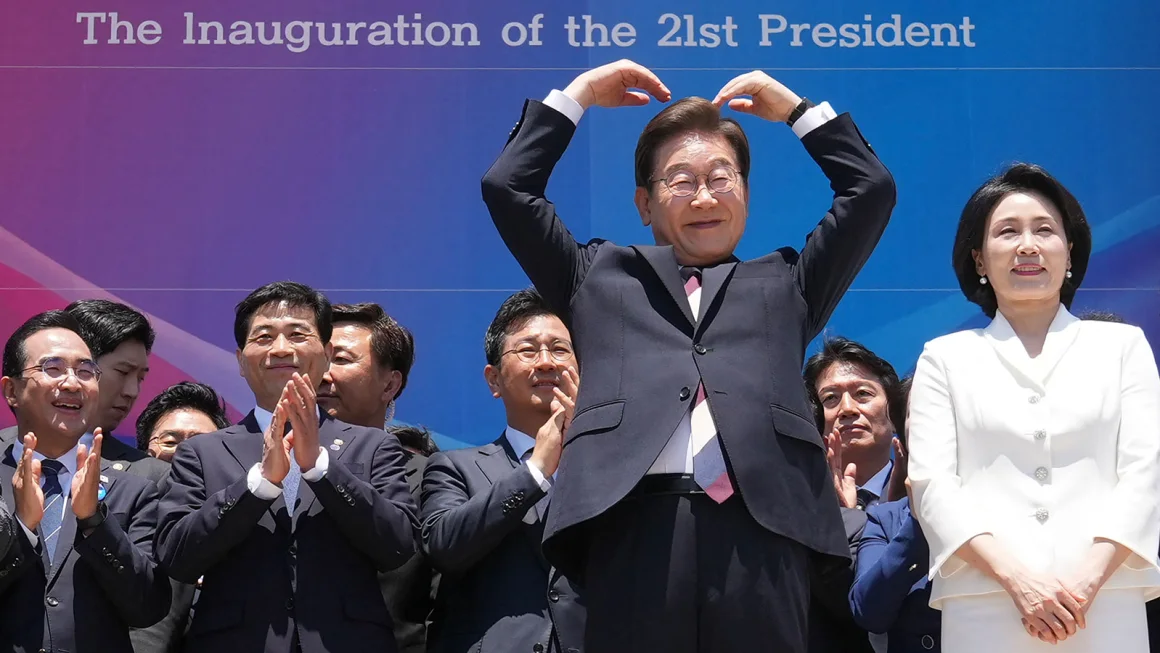
WafricNews – June 4, 2025
Seoul, South Korea – Once a teenage factory worker with a disabled arm and a family of seven struggling to survive, Lee Jae-myung is now the president of one of Asia’s economic giants. But behind the symbolism of his rise lies a fractured nation, weary from political upheaval and uncertain about its democratic future.
Seoul, South Korea – Once a teenage factory worker with a disabled arm and a family of seven struggling to survive, Lee Jae-myung is now the president of one of Asia’s economic giants. But behind the symbolism of his rise lies a fractured nation, weary from political upheaval and uncertain about its democratic future.
On Wednesday, Lee was sworn in as South Korea’s new head of state, following a sweeping electoral victory over conservative rival Kim Moon-soo. His election marks the end of a chaotic political chapter triggered by former President Yoon Suk-yeol’s shocking attempt to declare martial law late last year.
The fallout from that failed power grab left a deep imprint. Mass protests filled the streets of Seoul. Deep political fault lines widened, and the country operated without stable leadership for over six months. Now, with Lee at the helm, many South Koreans hope the storm is finally passing.
But healing won’t be easy.
A Presidency Born in Crisis
Lee takes office not only in the shadow of attempted authoritarianism, but also under the weight of his own legal troubles. He’s battling multiple corruption and abuse-of-power charges—accusations he insists are politically motivated and baseless. Though South Korean presidents typically enjoy immunity while in office, legal scholars remain divided on whether this applies to cases that predate their presidency.
Still, Lee struck a tone of unity during his inauguration. “It is time to replace hatred and confrontation with coexistence, reconciliation, and solidarity,” he declared to a hopeful crowd. “I will answer the earnest call to build a completely new nation.”
His victory also signals a major political shift. The liberal Democratic Party now controls both the presidency and parliament—putting an end to the paralysis that plagued the Yoon administration.
A Battle-Tested Leader
Lee’s dramatic political ascent mirrors stories familiar across many parts of Africa—of underdogs rising from hardship to national leadership. Born in Andong, a rural town in southeastern South Korea, he spent his teenage years in factories, working jobs that left him with lasting injuries. He watched classmates eat full meals and wear uniforms while he labored in silence.
Against the odds, he won a scholarship to Chung-Ang University, became a lawyer fighting for human rights, and entered politics as the mayor of Seongnam. His bold, populist style earned him both admirers and critics. In 2022, he narrowly lost the presidency. Just two years later, he survived a near-fatal stabbing during a public appearance in Busan, an attack widely condemned as a political assassination attempt.
That incident, followed by his viral role in physically defying martial law—caught on camera leaping fences to reach parliament—sealed his image as a defiant protector of democracy.
What Lies Ahead
Lee's presidency comes at a time of deep domestic and international uncertainty. South Korea’s export-heavy economy has been battered by global tariffs, particularly under the trade policies of U.S. President Donald Trump. The leadership vacuum during the crisis left Seoul without an effective voice in negotiations.
Lee has promised to act fast. “I will immediately activate an emergency economic response team to restore livelihoods,” he said, pledging to turn crisis into opportunity and renew South Korea’s economic resilience.
Foreign policy will be a tightrope. Lee must navigate a tricky balance between maintaining a strong U.S. alliance and managing complex economic ties with China—South Korea’s largest trading partner. While his predecessor Yoon adopted an aggressive posture towards North Korea, Lee’s party historically favors diplomacy and dialogue, even amid continued nuclear threats.
A Country Still Healing
Beyond policy, Lee must confront a public still traumatized by the recent power grab. Legal accountability for those behind the martial law attempt remains a burning issue. One voter, Kim Yong-gung, described driving two hours to protest the night martial law was declared, unsure if he would return alive.
“I told my wife to tell our children I was doing this for their future,” Kim said. “A better country can’t be built on fear.”
Lee acknowledged that pain in his address: “I will rebuild everything that was destroyed by the insurrection and ensure no leader ever again uses military power to rob the people of their sovereignty.”
For South Korea, the road to recovery is long. But in Lee Jae-myung, the country has chosen a man forged by hardship and controversy to lead them through it.
By WafricNews Desk.
By WafricNews Desk.


Comment
To post a comment, you have to login first
LoginNo Comments Yet...